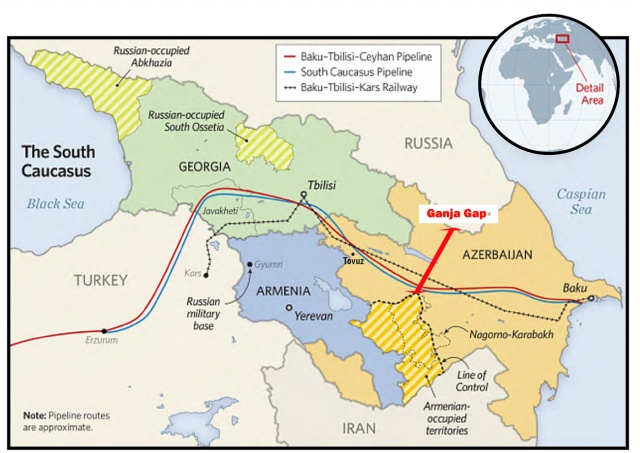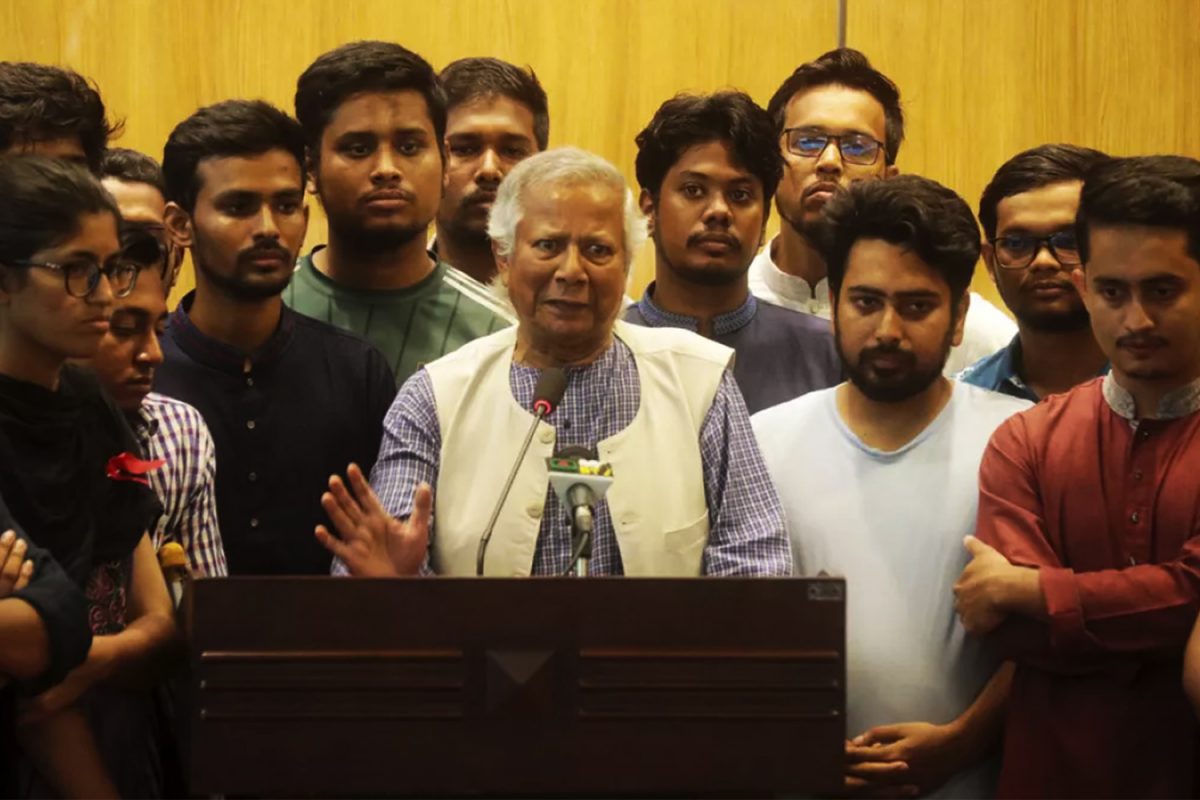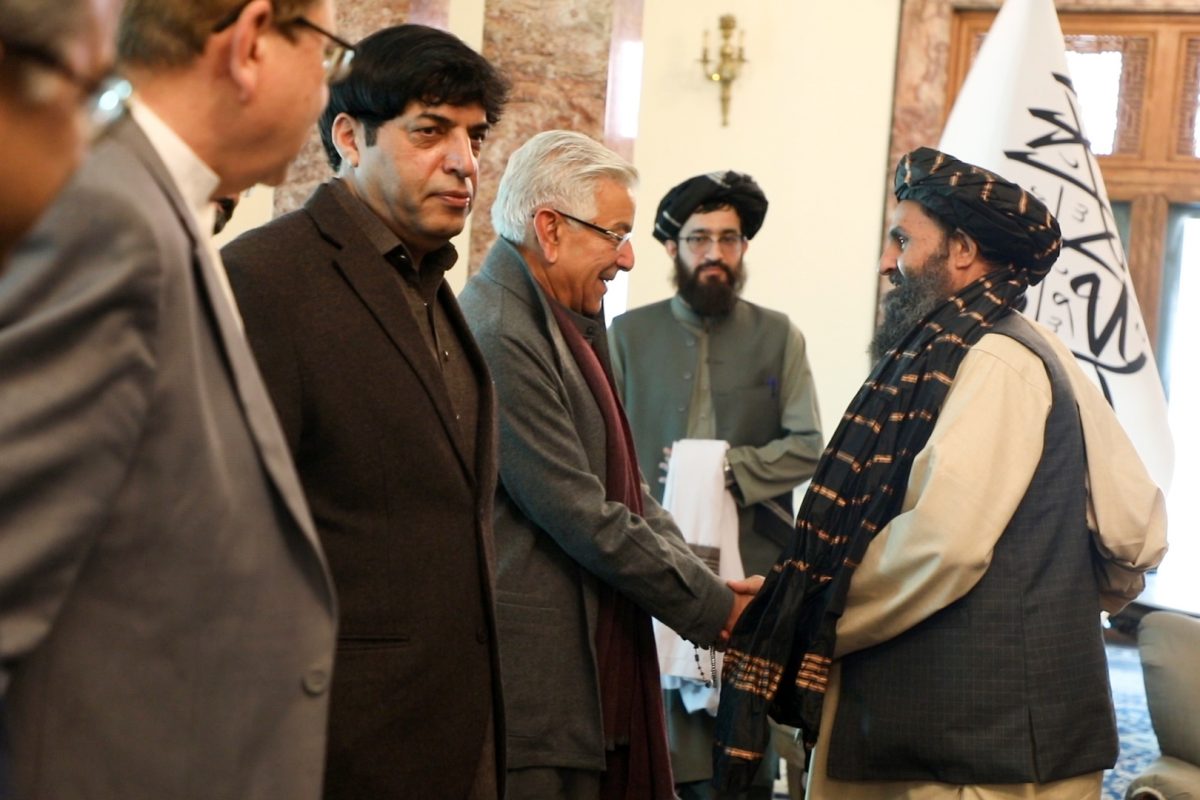Clashes have broken out between Armenia and Azerbaijan over the contested mountain enclave of Nagorno-Karabakh. The specific cause of this outbreak is unclear, but the area has been beset by low-level, regular skirmishes since the ceasefire in 1994. Reports from both sides suggest that more than 500 Armenian servicemen and 200 Azerbaijani troops have died. Armenia’s occupation of almost one-fifth of Azerbaijan’s territory (Nagorno-Karabakh) leaves Azerbaijan with only a 60-mile-wide tapering chokepoint for trade-called the ‘Ganja Gap’. Thus, the proximity of the Nagorno Karabakh conflict creates many problems for the oil flowing from the Caspian sea, which has to go through the choke point to the rest of the world’s oil markets, mostly to Europe.
Nagorno-Karabakh, along with much of the Caucasus, was contested by the Ottomans, Russians and the Persians for centuries. From the beginning of the 19th century, the Ottomans began to lose territories in the Caucasus and Central Asia to the Russian Tsars which consequently pushed the Ottomans back to Anatolia. The region of the Caucasus eventually became incorporated into the Soviet Union as the Transcaucasian Socialist Federative Soviet Republic in 1922. The Soviet Union divided the region with its cartographers to prevent Turkic unity since all Central Asian States were Turkic speaking (with the exception of Tajikistan who is culturally and linguistically Persian), and to prevent the region from achieving future Islamic unity.
During the last decades of the USSR, Nagorno-Karabakh became one of the first and the highest-profile issues to come under dispute. Starting in 1988, Armenians called for the incorporation of the majority-Armenian Nagorno-Karabakh into the Soviet Republic of Armenia. The Nagorno-Karabakh Oblast Committee of the Communist Party held an unprecedented unofficial referendum to rejoin Armenia. With Moscow slow to condemn such actions of ethnic violence erupted against the Armenians in Azerbaijan and Azeris in Armenia. This violence quickly spread into a full-scale military confrontation in which all Azerbaijanis were expelled from Nagorno-Karabakh, leading to the territory’s current Armenian-dominated population. Armenian forces defeated Azerbaijan in the conflict, leading to the independence of Nagorno-Karabakh and Armenian control of several provinces abutting Nagorno-Karabakh as a corridor into the region. Given that Azerbaijan is Muslim and Armenia is Christian, it further precipitated the intensity of the war between the two nations. But after the mediation by foreign powers- Russia, Turkey and Iran- a cease-fire was established to bring an end to the conflict in 1994.
Given that Azerbaijan is Muslim and Armenia is Christian, it further precipitated the intensity of the war between the two nations. But after the mediation by foreign powers- Russia, Turkey and Iran- a cease-fire was established to bring an end to the conflict in 1994
For most of the 20th century, Azerbaijan was under the Soviet sphere of influence where it experienced a brutal occupation, facilitating strong nationalism after the Soviet Union’s collapse. The same goes for the other five Central Asian states. Azerbaijan and the Central Asian countries have been extremely unstable as a region due to their distrust of Russian brutality under the Soviet period. Russia has always been troubled by the region which is culturally different especially, the region’s zeal for Islamic unity in the possible future which could create a domino effect reaching across the Muslim world. Henceforth, it was a geopolitical imperative for Russia to divide the region to protect its southern borders in Central Asia and also Caucasus. Today, the Central Asian countries, including Azerbaijan, despise the Russians for their partitions, which has caused Azerbaijan to look towards the West for aid and protection.
The Caspian Windfall
The Caucasus and Central Asia were firmly behind the iron curtain for most of the 20th century. With the fall of the Iron curtain in 1991 Central Asia’s and the Caspians energy became a prize for the taking. Ever since then there has been an open competition between foreign powers, especially the US and Russia to gain the region’s coveted wealth and control, or in Russia’s case maintain control. Russia has been able to maintain influence due to its historic links and geographical proximity but the contest between the two foreign powers remains fluid. Armenia remains pro-Russia where it receives extensive political support and military supplies from the Kremlin. Azerbaijan with its energy resources turned to the West especially as it wanted to loosen its dependency on Russia where pipelines that traverse its territory have been integrated into the western markets.
Baku is a geopolitical pivot which contains several riches in the caspain sea. The United States was the main proponent of the Baku-Tbilisi-Ceyhan (BTC) pipeline in 1995, which connected Azerbaijan’s Caspian energy to Turkey via Georgia. For Russia, this pipeline amongst others posed a threat as it was and remains an alternative to Russia’s energy to Europe. Georgia after the collapse of the Soviet Union completely turned pro-Western and this posed a major threat to Russian security on its borders on the Caucasus. In 2008 Russia went to war with Georgia and today it still maintains control of South Ossetia and Abkhazia. The former national security advisor to Jimmy Carter, Zbigniew Brzeziński, stated, “If the Georgian government is destabilized, Western access to Baku, the Caspian Sea and further will be limited.” For the US maintaining close ties with Azerbaijan and Georgia is to safeguard them and the oil from Russia. Russia’s backing of Armenia obstructs the flow of oil from the Caspian Sea to the West, which aids the Kremlin in maintaining European energy dependence on Russian oil and gas.
As Baku’s pipelines pass through a narrow gap between the Nagorno-Karabakh and the Armenian border – the ‘Ganja Gap,’ instability and the regular flare up of violence in this region impacts Caspian energy getting to European customers.

The Turkish Factor
Recep Tayyip Erdogan recently announced, “While I call on the Armenian people to take hold of their future against their leadership that is dragging them to catastrophe and those using it like puppets, we also call on entire world to stand with Azerbaijan in their battle against invasion and cruelty,” Erdogan then said on twitter, adding that Turkey will “increasingly continue” its solidarity with Baku.
Beginning in the 19th century the Ottoman’s power was in decline in the face of the Russian Tsars, it began to lose its control over Caucuses. Ever since then the Caucasus has been an area of constant competition between Turkey and Russia for influence which is reminiscent of the Ottoman and the Russian Empire rivalry. Turkey over the years has utilised its cultural and linguistic linkages to Azerbaijan and also other Central Asian states to maintain its influence. Turkey’s increasing power in the Mediterrenean and in the Black sea has been a rising concern in the Kremlin for sometime. Turkey rebuilding its historical Ottoman footprint in the region is something which the US supports as it would create instability for Russia in the Black sea, the Caucasus and even Central Asia. Zbigniew Brzeziński, America’s grand strategist stated, “ Turkey’s commitments to peaceful cooperation with its Middle East neighbours, a region of Turkey’s historic preeminence, is consistent with the security matters of the West in that region. Third, a Turkey that is increasingly secular, yet also Islamic – and that exploits its territorial and cultural connection with the peoples of the Ottoman Empire and the post-Soviet and Central Asian states- could be a Turkey that undermines the appeal of Islamic extremism and enhances regional stability…”[1]
The US supports Turkish maneuvers as it is too distant to have a dominion but too strong to be excluded from the region. Azerbaijan herself cannot face Russia alone and whilst the US cannot provide a vital strategic commitment since it is bogged down in its commitments elsewhere therefore, the US needs to utilise a ‘friend’ that can carry US interests in the region. For the last two decades the US has fought the Iraq and Afghan wars and this has kept the US tied up, which led it to neglect in increasing its efforts in supporting Azerbaijan against Armenia (Russian influence). Turkey not only provides a more cost-effective policy for the US but it also provides the US with a greater chance of success as has been the case with Turkey in Syria and now Libya.
Can a full blown war occur in the Caucasus? Wars in this region usually need the support of a larger power if they are going to be waged intensely. The reports state that Turkey has sent mercenaries from Syria to support Azerbaijan confirms this perspective. Both Azerbaijan and Armenia will not want to pay a high price for Nagorno-Karabakh, and neither Russia nor Turkey would want to test their power, even if they give the image that they are confident. Much like Syria, Libya and Ukraine it is external powers that will decide the outcome of this local dispute by backing different players, who can exploit the various fault lines to their advantage.
[1] Z.Brzezinski, Strategic Vision (Basic Books, Washington,2012) P.138





One comment
Umar Ahmad
2nd October 2020 at 9:42 pm
Wow this is a deep one… Puts the whole confusion into perspective, does away with the fog too.